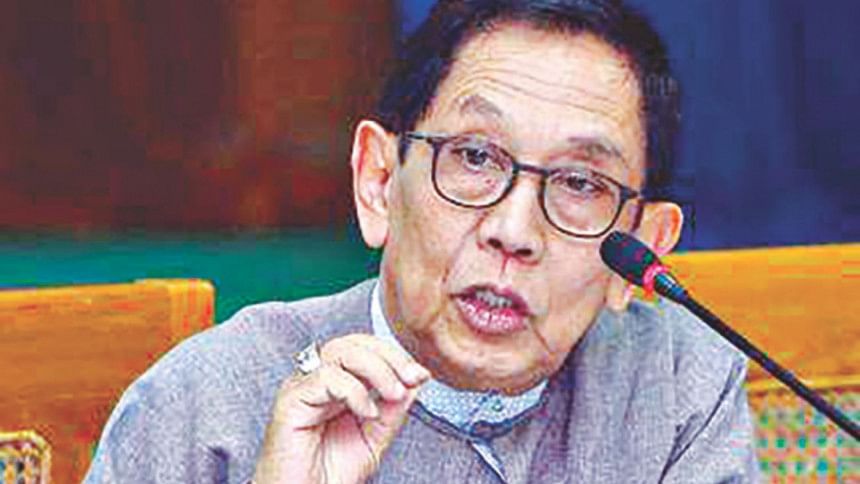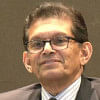‘Not my concern'

A top Myanmar official has admitted Rohingyas were tortured but played down the global concern over its ethnic cleansing, saying his government is now focusing instead on the safe, voluntary and dignified repatriation of the refugees.
“Tortures happened. But you know whether you would say 'oh it is genocide or ethnic cleansing… it is war crime', it's not my concern,” said Prof Dr Aung Tun Thet, chief coordinator of Myanmar's Union Enterprise for Humanitarian Assistance, Resettlement and Development in Rakhine.
He was talking to The Daily Star in an exclusive interview at a city hotel on April 12 when he accompanied Myanmar's Union Minister Dr Win Myat Aye to Bangladesh.
“Whatever has happened in Rakhine is not systematic, and that Myanmar is now working for their repatriation clearly demonstrates that there was no intention of ethnic cleansing… if we want to clean the ethnicity, we will not accept them. Then why should I be here?” Tun Thet said.
His comments come at a time when the prosecutor of the International Criminal Court (ICC) has sought jurisdiction to investigate the “deportation” of some 700,000 Rohingya from Rakhine to Bangladesh since August last year.
The international community has long called for referring Myanmar to the ICC for its atrocities on the Rohingya.
Doctors without Borders (MSF) said 6,700 Rohingya were killed in just one month since the crackdown that began on August 25.
International medical staff in Cox's Bazar said many civilians bore the physical and psychological scars of brutal sexual assaults allegedly by members of the Myanmar troops.
“The widespread threat and use of sexual violence was integral to their strategy, humiliating, terrorising and collectively punishing the Rohingya community and serving as a calculated tool to force them to flee their homelands and prevent their return,” said a report of UN Secretary General released on March 23.
The violence is linked with an inflammatory narrative alleging that high fertility rate among the Rohingya community represents an existential threat to the majority population in Myanmar, it said.
The Muslim minority in the Buddhist-majority Myanmar has been denied of citizenship since 1982 and basic rights, though they have been living there for generations.
Hundreds of thousands of Rohingya fled to Bangladesh in the earlier waves following persecutions, the latest one being the largest.
Amid global outcry, Myanmar signed a repatriation deal with Bangladesh in November.
Asked if Myanmar initiated the repatriation move under global pressure, Aung Tun responded in the negative, saying his country had been under such pressure for many years and that it was used to it.
“We are doing it because we think we, as a nation, need to do it,” said Prof Tun Thet, also a member of Myanmar's Peace Commission.
International relations experts questioned Myanmar's sincerity, arguing that citizenship, security and equal rights for them are very essential for their return but none of them has been guaranteed yet.
They argue that Myanmar has not given access to the UN Fact-Finding Mission and independent journalists in Rakhine lest they find out evidence of atrocities.
Besides, the Amnesty International reported that Myanmar authorities have been bulldozing Rohingya villages as part of their mission to destroy proofs.
But Tun Thet said it was not bulldozing, but “a sincere effort on the part of the local officials to clear the land to have it ready for the buildings.”
It was misinterpreted in the outside world, and so they stopped that, he added.
On giving citizenship to Rohingya, he said, “The only guarantee that we can give is that you have to go through the national verification process. If you go through it, you are sure of citizenship.”
He, however, admitted that in the past it was not easy for those having national verification cards (NVCs) to move freely. Now, with NVCs, people can move freely within their own township in Rakhine.
“Slowly as you build trust, then you would be eligible to have National Registration Card [citizenship],” he said.
Mohammed Ayub, a Rohingya blogger and activist now living in the UAE, however, said the NVC had no legal basis. Even no NVC is required to issue citizenship card under the 1982 citizenship law.
Myanmar wants Rohingya Muslims of Arakan to constitutionally disable by forcing them to accept NVCs that in turn will make them foreigners, he wrote in his blog, rohingyablogger.com.
Asked, Prof Tun Thet said there was no problem with the people (Rohingya) who lived in Myanmar for three to five generations.
But those who moved from Bangladesh to Rakhine recently may require some time to get citizenship, he added.
Mohammed Ayub argues that there is no reason for people to move to Rakhine from Bangladesh as the socio-economic situation is much better in Bangladesh than in Rakhine.
Only last week, UN Refugee Agency said conditions in Myanmar were not yet conducive for safe, dignified and sustainable returns of the Rohingya.
But Tun Thet, a top policymaker of Myanmar government, said they were working to create safe and secure environment as well as for economic opportunities and decent living involving the business community.
Foreign countries, including Singapore, Thailand, Indonesia, Japan, China and India are helping them redevelop Rakhine with infrastructure, road and electricity, he added.
“At the moment our mission is here to encourage the people [Rohingya] to return … we are trying to create situation where all will live peacefully.”
Asked why repatriation has not yet started though Bangladesh handed over a list of 8032 Rohingya on February 16, he said Bangladesh and Myanmar agreed that the returnees would have to fill prescribed forms with names of household members.
“Unless you fill it correctly, you will get a rejection. That's what has happened,” he said.
Earlier, Myanmar officials blamed Bangladesh for the “delay” in repatriation.
UN Refugee Agency said it had negotiated for a tripartite repatriation deal involving Bangladesh and Myanmar, but Myanmar refused. However, Myanmar now says it will sign a deal with the UNHCR and the UNDP on voluntary return of the Rohingya.
Asked on the UN role, Prof Tun said, “The UN has to recognise the concerns of any sovereign state. We are working very closely with the UNDP and the UNHCR because having them is good for us, good for the country.
“We don't think UN as the third party. We want the UN to be our part, not the third party that comes and says this is right or wrong.”

 For all latest news, follow The Daily Star's Google News channel.
For all latest news, follow The Daily Star's Google News channel. 








Comments